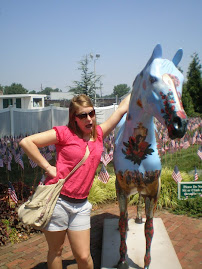3. Intermission
I always appreciated the orchestraic Intermission in Gone with the Wind. Generally, I skip over the intermission and flip over the disc, but when I’m feeling relaxed and unrushed, I love listening to the soothing-turned dramatic melancholy of the music.
I also love study intermission when my contacts stick to my drooping eyes, my legs are stiff from folding, and my bladder sloshes in my slumped stomach. I meander through the maze of rows, past a big number 5 by the elevator, and grope for the bathroom door. As I wash my hands, I think how strange and unrecognizable this floor looks; then again, I’m one of those students who uses the library once a semester, maybe once a year.
I’m careful not to scrub away the newly-inked writings on my palm,
A Diary from Dixie, Fields of Fury, Experiment in Rebellion, We Need Men.
As I walk back through, I glance at the different artworks between rows. Most are abstract, but the golden hues remind me of the framed picture of Paris that hangs in my grandmother’s garage; my grandfather sent it to her from France.
I retain my warm seat and glance one last time at the shelf.
Dixie’s Daughters. Yes, I could use that, too.
4.Experiment in Rebellion
and
(Dixie’s) Daddy’s Daughters
My mom was an uh-oh: Mema was nearly forty and Papa was 45 when little Kathy made her debut into the world. Mom was one of the last of the Baby Boomers, and since her brothers were into college and married by the time she started school, she became a regular Ellie Mae Clampett around the farm, befriending kittens and dogs and cows and any other stray critter that crawled into the realm of the lonely farm.
Despite the monotonous domestic chores, Mom felt entrapped inside and needed to be active and outside among nature, her furry friends, and her silent father. She forked hay bales, hitched wagons, steered tractors, mowed the yard, set and pulled tobacco, fed the cows, and ignored her mother’s protests that girls shouldn’t have to do such work. But Papa needed a hand and the boys were in Lexington with families and schools and jobs.
Until high school, Mom never recognized that Papa’s silence and bitterness masked post-traumatic stress and stifled psychological issues. His lack of communication hid an anxiety that rooted beneath his soil-tending hands and field-lingering feet.
Mom had a heart attack the summer before I started high school. We were in Florida at a softball tournament, and the ride back was miserable. She refused to go to the hospital, and her pain kept her vomiting on the side of the road as we moaned about her mental inability to handle extensive driving.
Soon, we would be in the hospital under the news that this minor heart attack was sparked by an intense anxiety attack.
When she began her anti-anxiety/anti-depression/other medication that kept her from repeating such an episode, my dad, sister, brother and I responded with positive encouragement. My dad told me once, “You know, I can tell a world of difference in your mom. She seems so much calmer now. She’s always had such a worry about endin’ up like your Papa, you know.”
I didn’t know. Until that moment, I didn’t know that Papa went years contemplating the detriments of psychological disorders as his only daughter grew up in disconnect, quitting the dance team and making her own clothes to ease the load from her parents. Mema always said that Mom kept them younger.
“You know, Daddy was quiet, but he loved doing things outside. And he loved baseball. That’s how I got my first busted nose,” Mom said through the phone. I could hear a hesitant smile spreading as she described playing catch with her brother and father by the old barn. “And Papa—he was a switch-hitter, too.”
I immediately saw a surfacing connection. Mom—my binary opposition in all things life—constantly sought paternal approval and had an ambidextrous father. Simple. Silly, perhaps. But it’s a connection that doesn’t include our shared ability to become slap happy after 10 pm or dance around the kitchen, singing into spatulas and swaying our hips.
Mom was never an athlete like me, and that is perhaps what separates us: I trained for years to become a collegiate pitcher, and maybe I never received a busted nose, but I remember the first time I completed a successful catch in the front yard between our two oak trees. I remember the feel of the ball in the pocket and the bright pleasure on my dad’s animated, mustached smile. Catching and playing and pitching and crying all went to my father, and he took it well. We connected, we were battery mates.
All similarities end, I suppose. At my age, my mother was married and working, not finishing school, and my father had been married two years, not scheming plans to hop continents. At my age, my grandmother was raising a child, not birthing a story, and my grandfather had just begun farming, unaware that he would soon meet his future wife—unaware that in six years, he would be soldiering from Africa to Europe, from boats to shores and barns to fields.
My parents call my Peace Corps-ing, mission-immersing plans adventurous and impractical; I call them self-fulfilling and story-worthy.
Monday, May 10, 2010
Subscribe to:
Post Comments (Atom)





No comments:
Post a Comment